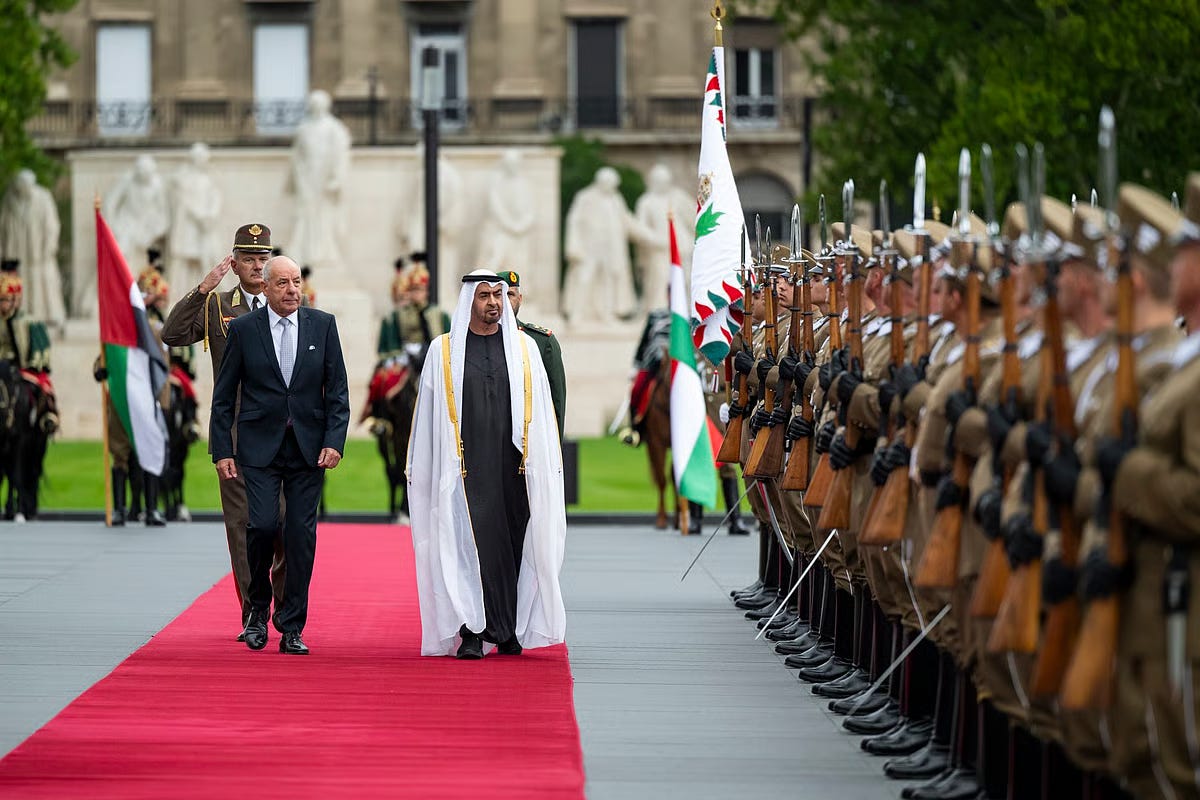Outsourcing Strategy: UAE Taps Hungary for Military Expansion
Abu Dhabi is diversifying its military supply chain in preparation for conflict.
During Emirati President Sheikh Mohamed bin Zayed Al Nahyan’s inaugural visit to Budapest on 17 July, the UAE signed memoranda of understanding with Hungary’s 4iG Group and UAE entities including EDGE, e&, and Mubadala. The agreements focus on defense technologies, digital infrastructure, and space systems, reflecting the UAE’s strategy to use Hungary as a hub for strengthening its military capabilities. With limited domestic production capacity, the UAE is outsourcing defense manufacturing, positioning Hungary as a key technological and logistical base linking the Middle East to Europe.
Hungary: UAE’s Defense Manufacturing Hub
The UAE’s deepening ties with Hungary reflect a calculated move to address its constrained domestic defense industry. With bilateral non-oil trade surging from $409 million in 2019 to $799.2 million in 2024, and the UAE accounting for 62% of Hungary’s GCC trade, the economic foundation for this partnership is robust. The MoUs with EDGE Group, a leading UAE defense conglomerate, signal Abu Dhabi’s intent to utilize Hungary’s pro-business environment to develop and potentially produce advanced defense technologies. Hungary’s EU membership further facilitates access to broader European markets and supply chains, making it an ideal outsourcing hub for the UAE’s military needs.
The UAE’s defense outsourcing strategy is also tied to its pursuit of an EU-UAE Free Trade Agreement (FTA), with negotiations launched on 28 May. Hungary, a strong advocate for the FTA, serves as a gateway for the UAE to secure favorable trade terms, potentially easing the flow of defense-related technologies and equipment. This contrasts with the UAE’s more restricted engagements in the U.S., where investments in tech and defense face stringent oversight from the Committee on Foreign Investment in the United States (CFIUS). Hungary’s looser regulatory framework allows the UAE to pursue ambitious defense projects with greater autonomy, positioning Budapest as a critical node in Abu Dhabi’s military build-up.
Strategic Pivot Amid Regional Tensions
The UAE’s focus on Hungary aligns with its need to prepare for upcoming regional conflicts, where domestic defense production capacity is insufficient. EDGE Group’s involvement in the MoUs underscores a push to develop advanced weaponry and defense systems, leveraging Hungary’s industrial base and technological expertise. The $6 billion urban development project near Budapest’s Rákosrendező railway station, while primarily economic, could also support logistics and infrastructure for defense-related activities. This partnership enables the UAE to diversify its military supply chain beyond traditional U.S. and Western allies, reducing dependence on geopolitically sensitive partners.
In contrast, UAE investments in the U.S., managed by ADIA and Mubadala, focus on AI, fintech, and semiconductors but are heavily constrained by national security regulations. While these investments provide access to cutting-edge technologies, they lack the flexibility of Hungary’s environment, where the UAE can pursue defense-oriented projects with fewer restrictions. The Hungary model allows Abu Dhabi to build a parallel defense ecosystem, enhancing its strategic autonomy as it prepares for potential regional instability.
By deepening ties with Hungary, the UAE is outsourcing critical defense production to bolster its military readiness for potential MENA conflicts. The EDGE Group’s partnerships with Hungary’s 4iG Group, facilitated by favorable economic and regulatory conditions, position Budapest as a key hub for the UAE’s defense ambitions. This strategy, supported by Hungary’s advocacy for an EU-UAE FTA, offers Abu Dhabi greater flexibility than its U.S. investments, enabling a more autonomous and agile approach to building its military capabilities.




